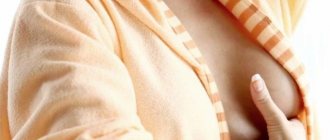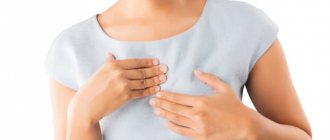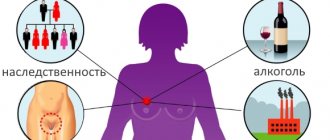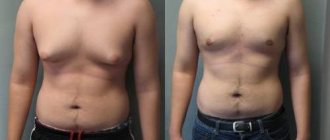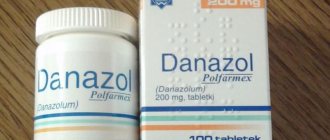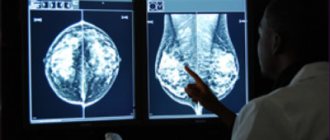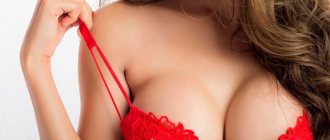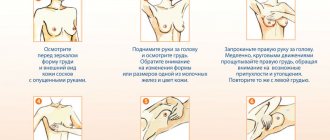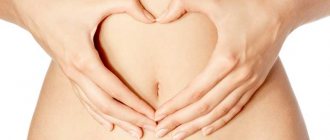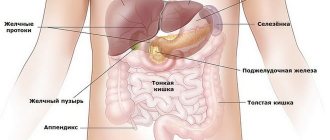About the disease
Mastopathy is the growth (benign neoplasm) of breast tissue.
It is quite common in women of all ages and occurs against the background of hormonal imbalance. Risk group :
- girls and young women (from 12 to 18 years old) during puberty, breast growth, the onset and establishment of menstruation;
- women, after 45-50 years, with the onset of menopause, menopause;
- women who have not given birth.
Breast mastopathy can also be observed in:
- newborns;
- children;
- and even in teenage boys and men.
Factors contributing to the development of mastopathy:
- genetic inheritance;
- late birth;
- abortions;
- short lactation period;
- taking hormonal drugs (contraceptives);
- diseases of the genital area;
- mammary gland injuries;
- diseases of the endocrine system;
- bad habits;
- nervous system disorders (stress, depression);
- mono diet;
- passion for solarium or excessive tanning;
- not regular sex life.
Symptoms of the disease:
- feeling of heaviness, pain, tingling in the mammary gland before the onset of menstruation;
- breast swelling, changes in shape and size;
- compaction around the nipple circles;
- discharge from the nipples (clear, purulent or bloody);
- the appearance of painful lumps in the chest (nodules, cysts).
Classification of the disease:
Doctors, in clinical practice, classify mastopathy into nodular and diffuse, which in turn are divided into several types. To make an accurate diagnosis, it is necessary to undergo an examination.
Attention! The diagnosis is made by a mammologist based on the results of an examination: breast ultrasound, mammography, laboratory tests.
- Diffuse mastopathy. On palpation, painful lumps are detected that have a lobulated or granular surface, of varying sizes, without clear boundaries. Diffuse mastopathy is characterized by compaction of glandular tissue, deformation of the ducts, discharge from the nipples, and the formation of a large number of cysts. Pain sensations can be of different types: aching, tingling, pulling. In the later stages of the disease, a change in the shape of the mammary gland occurs.
- Nodular mastopathy is divided into fibronodular, diffuse nodular and cystic nodular. It is characterized by a benign proliferation of breast tissue with the formation of compactions: small nodules, cystic capsules or nodular compactions of various sizes. At the initial stage, the disease does not manifest itself. Over time, painful sensations appear, which intensify before the onset of menstruation. Patients are often irritated, they experience nervous breakdowns and insomnia. The disease can develop in one or two mammary glands at once. Discharge from the nipples varies in color and quantity.
At the first symptoms of the disease, you should consult a mammologist.
Remember : there is always a risk of a benign tumor degenerating into a malignant one.
Local agents
To reduce lumps, relieve pain and relieve inflammation in the mammary glands, compresses are used, as well as products in the form of a gel or cream.
Compresses with Dimexide reduce pain and prevent the development of inflammatory processes
They have a good effect:
- Dimexide is a drug with an anesthetic, antimicrobial and anti-inflammatory effect. Used as compresses for 9 days up to twice a day. The product is quite toxic, so it should be applied with caution and diluted with water. Dimexide is not indicated for liver problems or kidney diseases. For severe pain arising from mastopathy, you can add painkillers to the drug, for example, Analgin. Dimexide is not the main treatment for breast diseases. As a rule, compresses with this remedy are used as an auxiliary method.
Mastofit is available not only in the form of a cream, but also in the form of tablets
- Mastofit is a creamy product that helps relieve swelling and tension in the mammary glands caused by impaired microcirculation and fluid retention in the tissues. The drug can be used to prevent pathological changes and prevent skin aging. Active substances of natural origin promote the resorption of seals. Mastofit can be applied to the glands not only for mastopathy, but also for engorgement and pain associated with the menstrual cycle. Indole contained in the cream provides tissue detoxification, has an antioxidant effect, and prevents the development of pathological tumors. Fucus saturates tissues with essential substances, improves blood supply, enhances microcirculation, thereby reducing swelling.
An applicator is used to apply the gel to ensure an accurate dosage of the active substance
- Progestogel is a gel based on progesterone, which is necessary to reduce the synthesis of estrogen. Hyperestrogenism leads to changes in the mammary glands, mastodynia, and nipple discharge. This remedy is applied topically and can be used by those women for whom hormone-based drugs are contraindicated, since Progestogel substances are absorbed into the blood in minimal quantities without causing side effects.
- The healer is a cream that can also be used for mastopathy and fluid stagnation in the breast tissue. Natural extracts, oils, beeswax improve blood circulation, relieve engorgement, and relieve pain in the glands. In addition to the therapeutic effect, women also note a cosmetic effect, which manifests itself in increased skin elasticity and restoration of breast shape. Calendula and calendula extract help prevent the development of malignant tumors and relieve inflammation.
The herb string, which is part of the Lekar cream, has a lot of healing properties.
Treatment Options
Is it possible to cure mastopathy? The answer is definitely “Yes!” The sooner mastopathy is detected, the faster you will get rid of it. What is prescribed for mastopathy?
Classical medicine offers various methods of treating mastopathy: hormonal drugs, non-hormonal treatment, surgical intervention.
- Surgical treatment The decision to operate on a patient is made in exceptional cases, when there is a suspicion of a malignant tumor, with the rapid growth of fibroadenoma. The operation for nodular mastopathy lasts about half an hour, using local or general anesthesia. During sectoral resection, the tumor and a small sector of the mammary gland are excised. During enucleation, the tumor (cyst) itself is removed (husked). Patients are discharged from the hospital within 24 hours, and the sutures are removed on an outpatient basis on the 10th day.
- Puncture If a large, single cyst has formed, patients are treated by puncture. When performing a puncture, the doctor punctures the cyst and pumps out the fluid using a special syringe. The procedure is performed under local anesthesia and the patient goes home the same day. If after puncture the nodular cyst appears again, enucleation is prescribed.
- Drug treatment of mastopathy Medicines for mastopathy begin to be taken only after examination and establishment of an accurate diagnosis. Only a specialist determines the dosage and duration of taking medications for mastopathy.
Mastopathy - treatment, drugs
The following medications are used for mastopathy of the mammary glands: antibiotics, hormonal, non-hormonal agents and topical drugs.
Antibiotics are prescribed in cases where mastopathy is accompanied by an inflammatory process that develops as a result of breast trauma, advanced forms of sexually transmitted diseases, and abscesses.
Treatment with antibiotics is always carried out if a malignant tumor is suspected. All antibiotics are divided into two groups: cephalosporins and penicillins. A course of antibiotic treatment for at least 5 days. Tablets are taken half an hour before meals or 2 hours after meals.
The best drugs for mastopathy - list:
- "Maxipim" is a medicine for mastopathy of the mammary glands. This is an antibiotic of the cephalosporin group, a powder for preparing infections; depending on the severity of the disease, 1-2 g are prescribed twice a day, intravenously or intramuscularly. Effective in the treatment of purulent inflammations and abscesses. Acts on pathogens at the cellular level, destroying membranes. Treatment of mastopathy with medication has contraindications: allergic reactions to the drug, chronic stomach diseases, pregnancy, kidney failure.
- "Movisar" is a drug against mastopathy. This is a IV generation antibiotic, powder for injection, recommended for the treatment of infectious gynecological diseases. In severe cases, 2 g is administered intravenously after 12 hours, in the rest, 0.5-1 g is administered intramuscularly. Contraindications : allergies to the drug, pregnancy (only under medical supervision), severe forms of chronic diseases.
- Penicillin in tablets and injections is used to treat sexually transmitted diseases, abscesses, and purulent-inflammatory processes. Injections are given subcutaneously, intravenously, intramuscularly, and, if necessary, into the spinal canal. Dose calculation : per 1 ml of blood/0.1-0.3 units of the drug. Penicillin is administered to patients after 4 hours. For mastopathy, tablets are taken according to the regimen of 250/500 mg every 8 hours. The duration of taking the tablets is individual, depending on the course of the disease. Contraindications : sensitivity to substances included in the drug, severe forms of kidney and liver disease.
Hormonal drugs
What pills to take for mastopathy? Is it possible to take birth control pills if you have mastopathy? Answers to these questions and a list of medications for breast mastopathy:
- “Tamoxifen” is an antiestrogens drug that helps reduce estrogen levels in the female body, reduces pain, restores the menstrual cycle, and blocks tissue proliferation (oncological). Tamoxifen is used twice a day (morning/evening), regardless of meals, in doses of 20 to 40 mg, tablets are not chewed, washed down with water. For a one-time dose - in the morning. The course of treatment lasts until stable positive results. Contraindications: cataracts, liver failure, pregnancy, breastfeeding, intolerance to the drug.
- You can take contraceptives: Femoden , Marvelon , Silest , Mercilon . They are recommended for use by women of childbearing age. These contraceptives are 100% effective. They restore the menstrual cycle, reduce pain, and prevent the maturation of the egg. With long-term use, the symptoms of mastopathy decrease. The tablets are taken once, preferably at the same time. Contraindications: thrombosis, liver disease, pregnancy, pancreatitis, vaginal bleeding, individual intolerance.
- "Orgametril" is a hormonal remedy for mastopathy. The tablets are taken for 10 days in a row, 1 piece at a time, the course of treatment begins two weeks after the start of menstruation, the duration of use is at least 4 cycles. Contraindications : blood diseases, pregnancy, liver diseases, diabetes, allergic reactions to the components of the drug.
- "Parlodel" . For mastopathy, the drug is taken 1 tablet 2-3 times a day, followed by doubling the dose. Course: until a sustainable positive result. The drug helps establish the balance of progesterone and estrogens in a woman’s body and restores reproduction. Contraindications : hypertension, gastric ulcer, cardiovascular diseases, individual intolerance.
Non-hormonal drugs
Non-hormonal drops and tablets for mastopathy - names:
- "Mastodinon" (tablets, drops) is an effective medicine for mastopathy. This is a homeopathic drug that helps reduce prolactin, creating conditions to stop the growth of fibrocystic mastopathy. “Mastodinon” is taken 30 drops (1 tablet) twice a day, washed down with a small amount of liquid, the drops are pre-diluted in water. The first results will appear in 2 months. Contraindications for use: pregnancy, breastfeeding, individual intolerance.
- "Remens" drug is produced in the form of tablets and drops. Directions: dilute 10 drops in a small amount of water, hold in the mouth for a few seconds and swallow, place the tablet under the tongue and hold until completely dissolved. The daily norm is 30 drops or 3 tablets. The course of treatment is 3 months, a month break and, if necessary, the course is repeated. Contraindications: individual intolerance.
- Wobenzym is a good medicine for mastopathy. In addition, it is an anti-inflammatory, immunomodulatory agent. Take 3 tablets in the morning, lunch and evening. Duration of treatment is from two weeks to two months. Contraindications: intolerance to the drug, blood diseases, hemodialysis.
- Mamoclam tablets for mastopathy also reduce the risk of developing a malignant tumor. Take 1-2 tablets 3 times a day, the course of treatment is up to 3 months. Treatment is carried out under the supervision of an oncologist (gynecologist). Contraindications : thyroid disease, renal failure, chronic pyoderma, skin diseases.
- "Mulimen" is a new medicine for mastopathy. This is an anti-inflammatory, antispasmodic biological drug (drops). Its action is aimed at activating and restoring the body's own defenses. 15 drops are dissolved in water, drunk 3-5 times a day, after holding the solution in the mouth. Duration of treatment is 1-3 months. There are no contraindications for use.
Use of creams, ointments, gels
- "Progestogel" is an effective remedy for mastopathy. This is a gel that blocks receptors and reduces estrogen concentrations. It is not absorbed into the blood, relieves swelling, reduces pain. Using an applicator, apply to the skin, without touching the nipples and around the nipple circles, a small amount of gel is distributed in a thin layer (the gel is well absorbed). The procedure is carried out 2 times, morning and evening for 3 months. Contraindications : nodular forms of mastopathy, neoplasms of unknown etiology, malignant tumors, pregnancy, intolerance to the components of the drug.
- “Mastofit” (cream) is a dietary supplement recommended for the treatment of mastopathy in the early stages of the disease. The active ingredients of the cream normalize the natural processes of the body, activate the metabolism of the skin, and eliminate breast swelling. The cream is applied 1-2 times a day, with light massage movements, until completely absorbed. The shelf life of the product is 2 years from the date of manufacture. Contraindications: allergic reaction to the components of the cream.
What other external remedies can be used to treat mastopathy? Read more in the article.
Indications for use
Mastodinon is used as a symptomatic agent as part of complex therapy for the following diseases/conditions:
- Menstrual irregularities that develop as a result of insufficiency of the corpus luteum;
- Fibrocystic mastopathy;
- Premenstrual syndrome, manifested by mental lability, swelling, constipation, headache, migraine, as well as painful tension in the mammary glands;
- Infertility (due to corpus luteum deficiency).
Absolute:
- Pregnancy;
- Lactation;
- Age up to 12 years;
- Hypersensitivity to the drug.
Due to the lactose content in tablets, Mastodinon is contraindicated in cases of hereditary galactose intolerance, glucose/galactose malabsorption, and genetic lactase deficiency.
According to the instructions, Mastodinon is not used for the treatment of malignant diseases of the mammary gland.
A drug
– premenstrual syndrome (breast tension, mental lability, constipation, swelling, headache/migraine);
– fibrocystic mastopathy;
– menstrual irregularities and/or infertility caused by insufficiency of the corpus luteum.
Contraindications to the use of the drug
– Hypersensitivity to the components of the drug.
– The drug should not be used during pregnancy and breastfeeding.
– Children under 12 years of age.
not used in the treatment of malignant diseases of the mammary glands.
Due to the lactose content, this medicinal product is not suitable for patients suffering from rare inherited galactose intolerance, genetic lactase deficiency or glucose-galactose malabsorption.
A drug
should not be used in children under 12 years of age.
Which combination is most effective?
It is difficult to say what is the best remedy for mastopathy in women. After all, for effective treatment you need to create a combination of specific drugs. And only a specialist can do this.
We are confident that such a serious disease cannot be cured with one drug.
A whole range of activities is needed:
- examination;
- antibiotic treatment;
- course of hormonal therapy;
- taking non-hormonal drugs;
- local drugs.
What to add?
When treating mastopathy, medications can be supplemented with:
- Folk remedies: alcoholic tinctures of medicinal herbs, herbal infusions, analgesic decoctions, compresses, applications, ointments based on medicinal plants and beekeeping products.
- Vitamin complexes.
- Hirudotherapy: treatment with leeches.
- Using Chinese patches.
- Healthy lifestyle.
You may be interested in information on how to use for mastopathy:
- flax ointment;
- Bromcamphor;
- homeopathic remedies;
- various compresses.
And also read here about which products are ok and which are contraindicated for mastopathy.
Now you know everything about mastopathy and medications for treatment. But remember that disease is easier to prevent than to treat. Daily breast examinations, regular visits to the doctor, and mammography are the key to a woman’s health and happy life.
You can find more information on this topic in the Treatment section.
Herbal remedies
You should consult your doctor about how to treat mastopathy with herbal preparations.
Taking any medications for mastopathy should be discussed with a mammologist
The best remedies to improve the condition of the mammary glands are the following:
- Mastodinon is a natural medicine for mastopathy, containing a number of extracts that are useful for the female body, helping to normalize the balance of hormones, get rid of engorgement, swelling, and soreness in the breasts. Since mastopathy in some patients is accompanied by dysfunctions of the nervous and digestive systems, the use of the medicine helps improve the condition of the gastrointestinal tract (GIT) and get rid of irritability. The form of the drug - drops or tablets - is prescribed based on the presence of concomitant diseases and the patient’s preferences. Mastodinon in rare cases can cause skin rashes.
The use of Mastodinon is recommended not only for mastopathy, but also for menstrual irregularities
- Klamin is a product consisting of kelp, which is a natural source of iodine. It is used not only for thyroid dysfunction, but also for diseases of the breast and reproductive system. Synthetic iodine preparations, which have a number of side effects, can be replaced with Klamin with the permission of a doctor. In addition to saturating the body with this essential substance, which promotes the synthesis of thyroid hormones, the drug can be used for vitamin deficiency and gastrointestinal disorders. If mastopathy is accompanied by thyrotoxicosis, such drugs are not prescribed.
- Phytolon is a relatively new drug that helps reduce pain in the mammary glands and restore the correct balance of hormones in the body. The product is indicated for multiple cysts and compactions. For toxic goiter and signs of thyrotoxicosis, Fitolon is contraindicated.
Phytolon is a powerful natural immunomodulator and antioxidant.
- Wobenzym is a natural remedy containing a number of enzymatic substances that help not only improve the condition of the digestive system, but also reduce the symptoms of mastopathy. Improvement in the condition of the mammary glands while taking Wobenzym is associated with the normalization of intestinal function, which reduces the reabsorption into the blood of hormones that are excreted in bile. Anti-inflammatory drugs taken in combination with Wobenzym act much more effectively, which is very important for inflammatory processes in the reproductive organs and mammary glands. This enzymatic agent improves immunity and has a diuretic effect.

